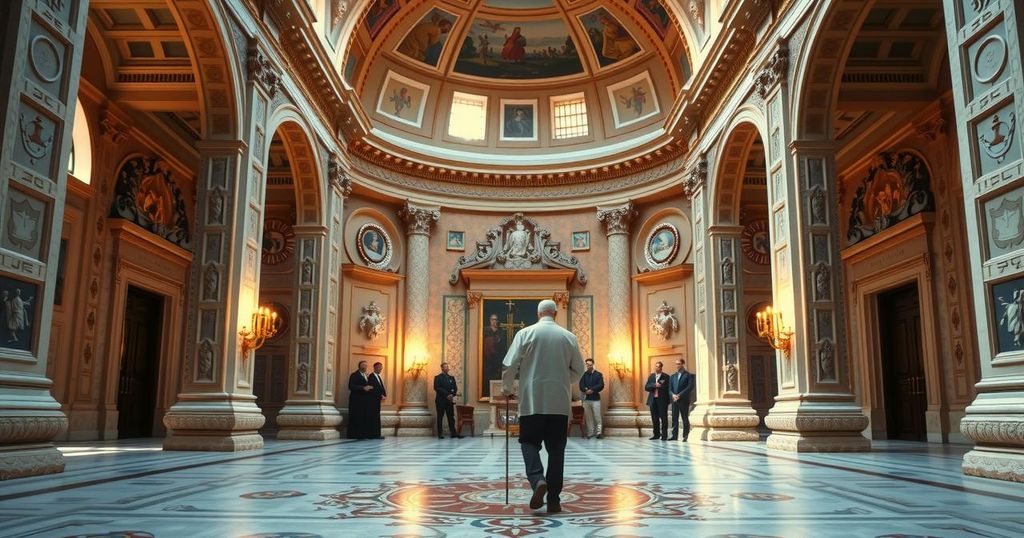Colombia’s President Addresses Climate Challenges in Meeting with Pope
Colombian President Gustavo Petro met Pope Leo XIV on May 19, 2025, discussing critical issues such as climate change and Colombia’s domestic conflict. Petro urged that climate action must take precedence, linking it to migration and violence. The meeting concluded with a formal invitation for the Pope to visit Colombia, emphasizing spiritual significance in places like Chiribiquete National Park.
On May 19, 2025, Colombian President Gustavo Petro held a significant audience with Pope Leo XIV at the Vatican. This meeting, conducted in the private setting of the Apostolic Palace, lasted approximately 22 minutes. It marked Petro’s first interaction with the newly elected pontiff. Sources indicate that the discussion was both cordial and intense, highlighting serious issues facing Colombia and beyond, from internal conflicts to global climate change.
Petro utilized this opportunity to deliver a bold message regarding climate change. He emphasized that it should not be viewed as an abstract concern but rather as a critical issue affecting the future of humanity and global politics. He remarked to the Pope, “If the U.S. government continues to treat migration as the core issue, it will end up sacrificing its own children.” This pointed statement served to stress that climate action should take precedence over anything else, warning that neglecting it would foster further displacement and conflict.
Furthermore, Petro looked to Pope Leo XIV, himself born in the United States, for guidance in bridging cultural divides—especially in fostering awareness in Washington. He articulated a plea for the Pope to advocate for a shift in priorities, encapsulating this urgency with the phrase “the real priority: life itself.”
The discussion did not shy away from Colombia’s domestic struggles, particularly with guerrilla groups like the ELN. Petro candidly admitted these groups have strayed from their revolutionary goals, now engaging in narcotrafficking. Nonetheless, he remained optimistic about reconciliation, stating, “the path remains open.” He highlighted ongoing peace dialogues in Cuba and Venezuela but suggested that the Vatican could play a pivotal role, invoking the idea of “effective love” as a guiding political principle in resolving conflict.
Following the main meeting, Archbishop Paul Richard Gallagher, the Vatican’s Secretary for Relations with States, had a separate conversation with Petro, affirming the diplomatic ties between Colombia and the Holy See. This, according to a Vatican press release, reinforces their collective commitment to fostering peace, not only in Colombia but throughout Latin America.
Petro’s visit had a deeply spiritual aspect as well. He recounted a previous visit to the community of Sant’Egidio, reflecting on the poignant significance of its relics in light of ongoing global violence, particularly in Palestine. He saw parallels between historical suffering and present geopolitical tensions, merging the sacred past with contemporary issues.
Before concluding his visit, Petro extended an invitation to Pope Leo XIV to travel to Colombia. He envisioned the Pope not just visiting Bogotá but exploring significant sites like Chiribiquete National Park in the Amazon and Santa Marta, which holds spiritual importance. Petro described Chiribiquete as “the first land to rise from the waters,” emphasizing its rich history and vulnerability to ecological harm. He expressed a narrative transition: “that place is proof that we were not discovered—we were already here,” challenging traditional colonial perspectives.
This meeting between President Petro and Pope Leo XIV underscores a crucial dialogue about Colombia’s future, the importance of climate action, reconciliation efforts, and the quest for peace in a turbulent world.
In conclusion, President Gustavo Petro’s meeting with Pope Leo XIV at the Vatican highlighted a series of pressing issues. From a strong appeal for urgent climate action to the dynamics of Colombia’s internal conflict, the dialogue touched upon critical themes. Petro’s aspirations for a peaceful and sustainable future resonate widely, calling for a shift in focus toward life and humanitarian values at a global scale. The invitation to the Pope further emphasizes the hope for guidance and moral leadership in confronting these challenges.
Original Source: zenit.org




Post Comment